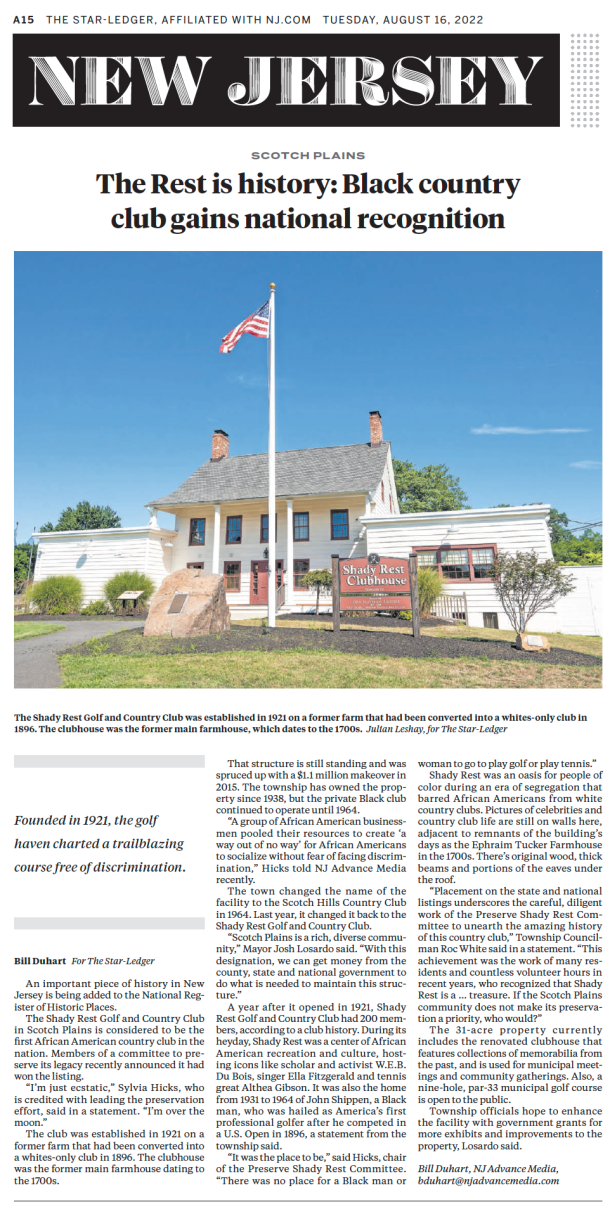
See the full article by Clicking Here
The Rest is history: Black country club gains national recognition
Founded in 1921, the golf haven charted a trailblazing course free of discrimination.
Bill Duhart For The Star-Ledger
An important piece of history in New Jersey is being added to the National Register of Historic Places.
The Shady Rest Golf and Country Club in Scotch Plains is considered to be the first African American country club in the nation. Members of a committee to preserve its legacy recently announced it had won the listing.
“I’m just ecstatic,” Sylvia Hicks, who is credited with leading the preservation effort, said in a statement. “I’m over the moon.”
The club was established in 1921 on a former farm that had been converted into a whites-only club in 1896. The clubhouse was the former main farmhouse dating to the 1700s.
That structure is still standing and was spruced up with a $1.1 million makeover in 2015. The township has owned the property since 1938, but the private Black club continued to operate until 1964.
“A group of African American businessmen pooled their resources to create ‘a way out of no way’ for African Americans to socialize without fear of facing discrimination,” Hicks told NJ Advance Media recently.
The town changed the name of the facility to the Scotch Hills Country Club in 1964. Last year, it changed it back to the Shady Rest Golf and Country Club.
“Scotch Plains is a rich, diverse community,” Mayor Josh Losardo said. “With this designation, we can get money from the county, state and national government to do what is needed to maintain this structure.”
A year after it opened in 1921, Shady Rest Golf and Country Club had 200 members, according to a club history. During its heyday, Shady Rest was a center of African American recreation and culture, hosting icons like scholar and activist W.E.B. Du Bois, singer Ella Fitzgerald and tennis great Althea Gibson. It was also the home from 1931 to 1964 of John Shippen, a Black man, who was hailed as America’s first professional golfer after he competed in a U.S. Open in 1896, a statement from the township said.
“It was the place to be,” said Hicks, chair of the Preserve Shady Rest Committee. “There was no place for a Black man or woman to go to play golf or play tennis.”
Shady Rest was an oasis for people of color during an era of segregation that barred African Americans from white country clubs. Pictures of celebrities and country club life are still on walls here, adjacent to remnants of the building’s days as the Ephraim Tucker Farmhouse in the 1700s. There’s original wood, thick beams and portions of the eaves under the roof.
“Placement on the state and national listings underscores the careful, diligent work of the Preserve Shady Rest Committee to unearth the amazing history of this country club,” Township Councilman Roc White said in a statement. “This achievement was the work of many residents and countless volunteer hours in recent years, who recognized that Shady Rest is a ... treasure. If the Scotch Plains community does not make its preservation a priority, who would?”
The 31-acre property currently includes the renovated clubhouse that features collections of memorabilia from the past, and is used for municipal meetings and community gatherings. Also, a nine-hole, par-33 municipal golf course is open to the public. Township officials hope to enhance the facility with government grants for more exhibits and improvements to the property, Losardo said.
Photo Credit: The Shady Rest Golf and Country Club was established in 1921 on a former farm that had been converted into a whites-only club in 1896. The clubhouse was the former main farmhouse, which dates to the 1700s. Julian Leshay, for The Star-Ledger
Bill Duhart, NJ Advance Media
See the full article by Clicking Here
